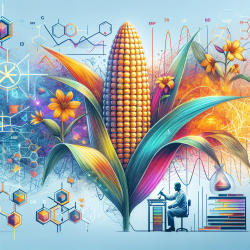Introduction
Maize, a staple crop across the globe, holds immense potential for genetic improvement through advanced genomic techniques. The research article "Advances in Maize Genomics and Their Value for Enhancing Genetic Gains from Breeding" provides a comprehensive overview of the strides made in maize genomics and how these can be leveraged for breeding better cultivars. This blog explores key takeaways from the research and suggests ways practitioners can enhance their skills and outcomes in plant breeding.
Understanding Genetic, Molecular, and Functional Diversity
Maize exhibits significant genetic diversity, which is crucial for breeding programs aimed at improving crop resilience and productivity. The use of molecular markers, particularly SNP markers, has revolutionized the study of genetic diversity in maize. These markers allow for precise genetic mapping, enabling breeders to identify and select desirable traits more effectively.
Genetic Mapping and Trait Tagging
Genetic mapping has evolved from conventional linkage mapping to more sophisticated techniques like linkage disequilibrium-based association analyses. This advancement allows for the identification of QTLs (Quantitative Trait Loci) associated with important agronomic traits such as yield, pest resistance, and stress tolerance. Practitioners are encouraged to integrate these mapping techniques into their breeding programs to enhance selection accuracy.
Leveraging Genomics-Assisted Breeding
Genomics-assisted breeding is a transformative approach that combines traditional breeding methods with genomic data to accelerate the development of superior maize varieties. The integration of genomic databases and informatics tools, such as MaizeGDB, provides breeders with access to a wealth of genetic information. This can be used to streamline the breeding process and achieve genetic gains more efficiently.
Future Directions and Opportunities
The future of maize breeding lies in the continued development of genomic tools and resources. Emphasis should be placed on creating strategic germplasm resources and enhancing molecular breeding techniques for tropical maize products. Practitioners should stay informed about the latest developments in maize genomics through conferences, publications, and webinars to remain at the forefront of breeding innovation.
Conclusion
Advancements in maize genomics offer unprecedented opportunities for enhancing genetic gains in plant breeding. By incorporating genomic insights into breeding strategies, practitioners can develop maize varieties that meet the demands of food security, feed, and biofuel production. To delve deeper into the research findings, practitioners are encouraged to read the original research paper, Advances in Maize Genomics and Their Value for Enhancing Genetic Gains from Breeding.










